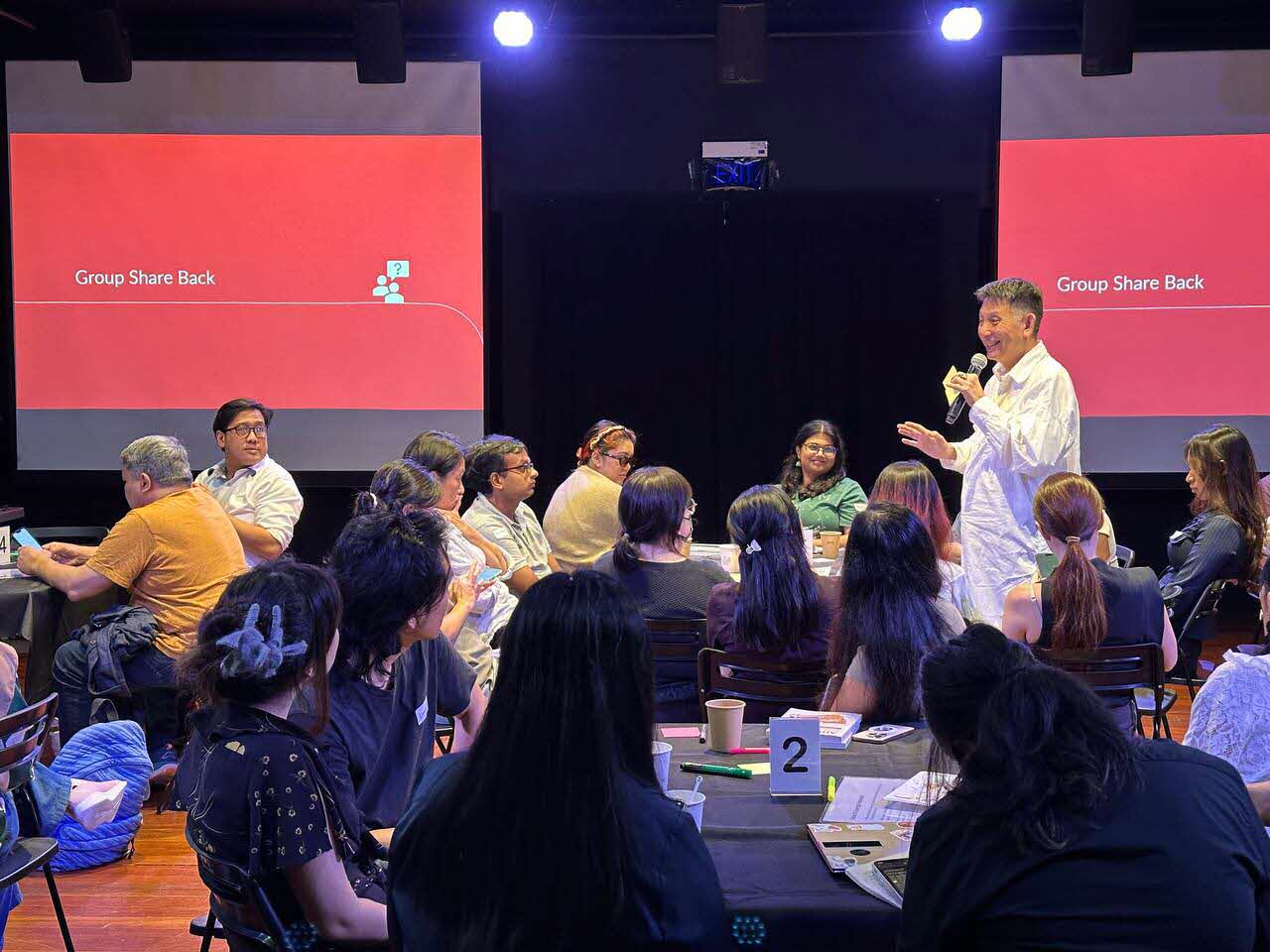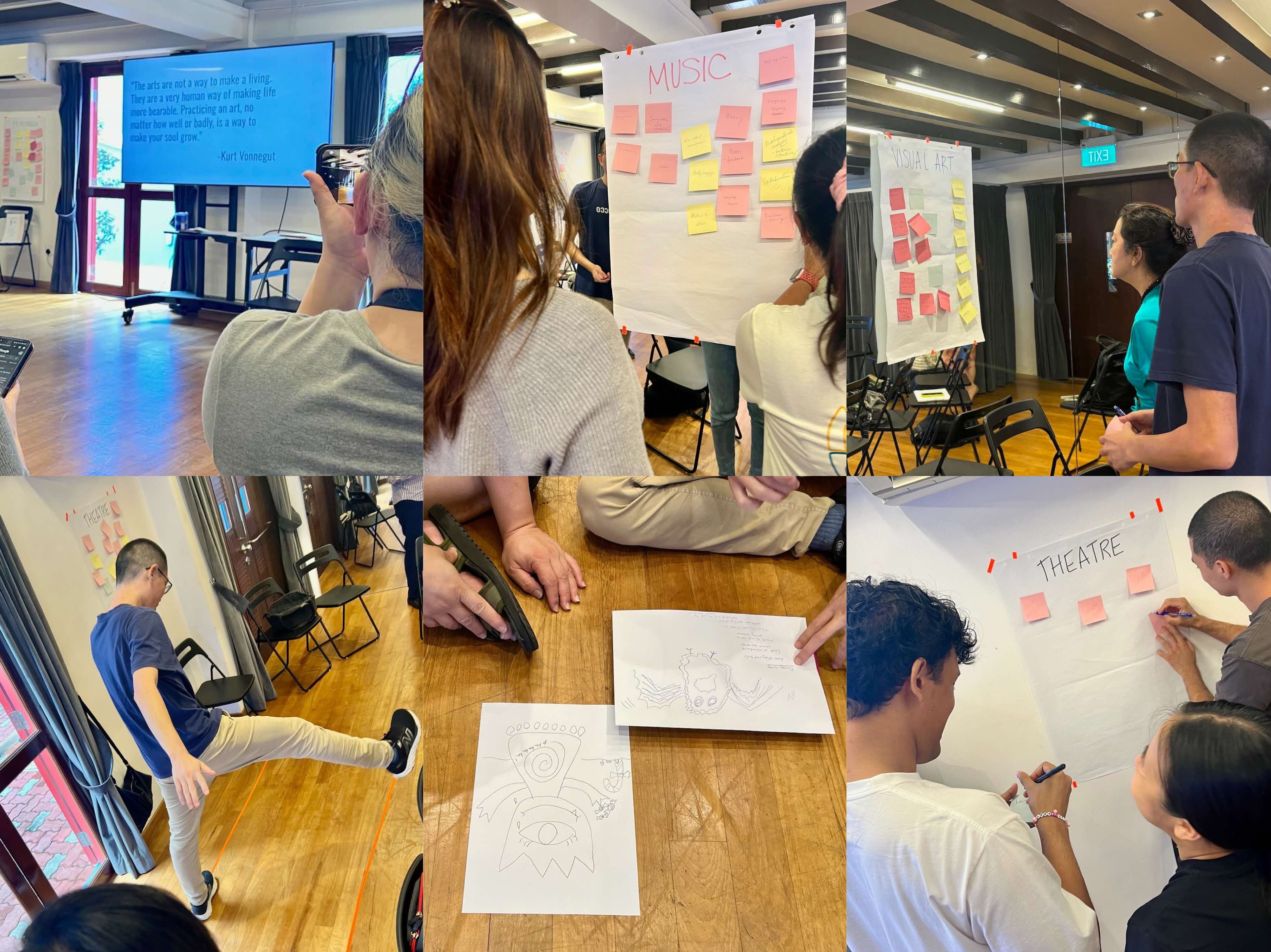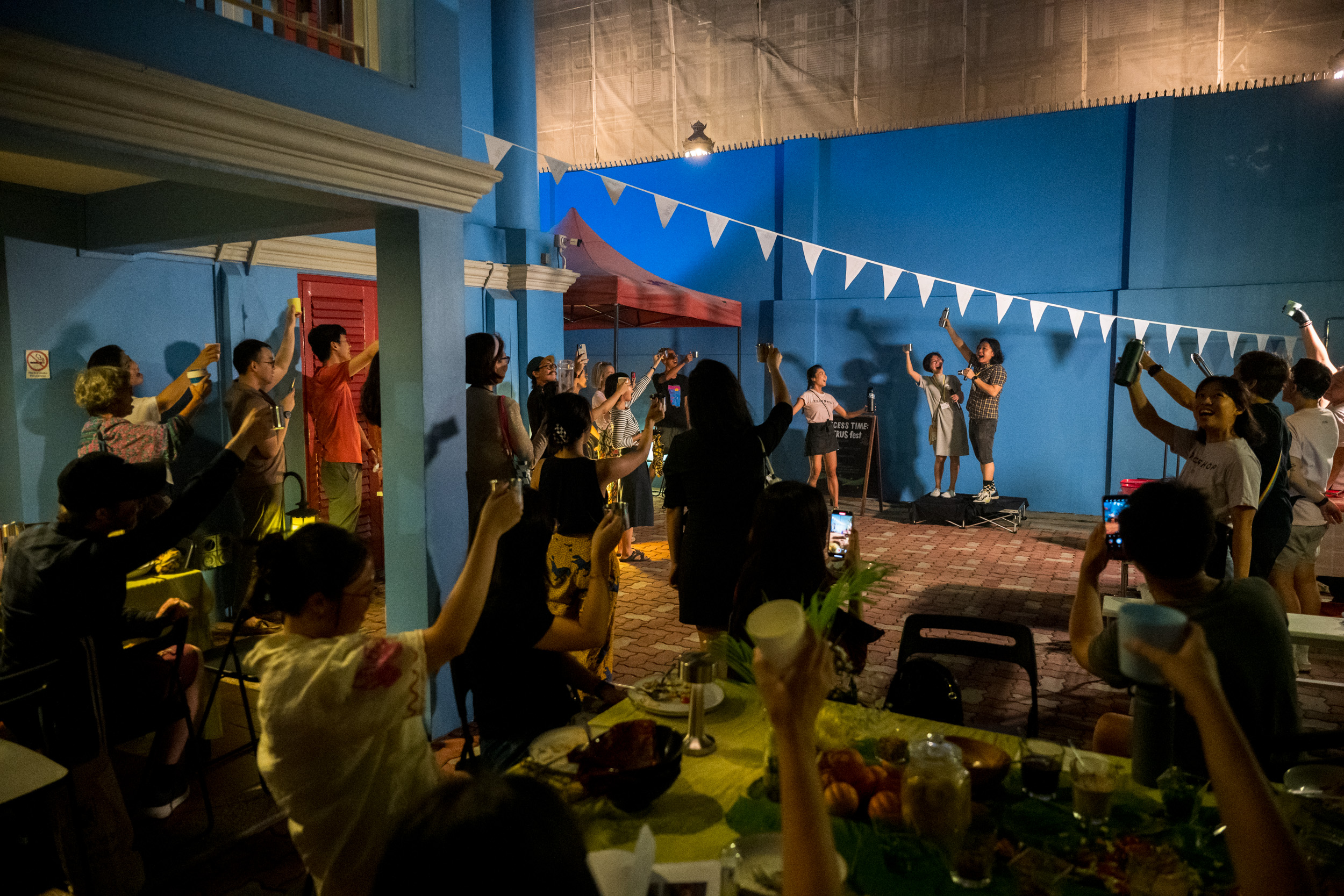The ARH Connects supports learning and networking for arts Self-Employed Persons (SEPs), and spans the fields of finance, legal, wellness and more.

360 Video Creation for Immersive Experiences
ARH Learns
The Arts Resource Hub connects independent arts practitioners with industry knowledge and expert guidance through our events and programmes. Couldn't make it to our ARH Connects sessions? Here are summarised insights and practical takeaways from our recent talks, workshops, and peer learning sessions.
The Legal Mixer
The Arts Resource Hub, in collaboration with Pro Bono SG, hosted two sessions of The Legal Mixer – a learning and networking series for independent arts practitioners. Participants rotated between tables led by volunteer legal experts, engaging in conversations on key legal topics on contract, intellectual property and business structures for creative careers. Over food and drinks, arts practitioners shared their experiences, challenges and mitigation strategies, while gaining practical insights from both legal experts and peers. The informal, collaborative format fostered open dialogue and led to useful takeaways for navigating legal matters in their work.

Here are some of the key insights and practical tips from the sessions:
Contracts and Negotiations
Understanding Contracts
- Contracts are legally binding agreements that set out the parties' rights and obligations. While the exact terms may vary across creative industries and projects, contracts are essential tools for you to establish clear terms, safeguard your work and ensure mutual obligations and expectations are understood.
- Contracts can be formed orally or in writing. Written contracts are always preferred as proving an oral contract without some form of written evidence is very difficult.
- Setting out key contract terms via digital communications such as WhatsApp messages and emails can constitute or evidence valid contracts if they clearly outline key details such as scope of work, deliverables, timeline, and payment—especially important in the event of disputes.
Negotiation Strategies
- Start by identifying your non-negotiables and priorities before entering into discussions.
- Build rapport with the other party by discussing terms that can be easily agreed upon before addressing more complex issues.
- Remember that power dynamics matter: larger organisations typically provide contract templates, but you can still negotiate terms.
- Understand that your counterparty may not understand what is the industry standard or how things are done – there may be an element of education as to why your preferred position makes more sense.
- Know that walking away is always an option if terms don’t meet your minimum requirements or if the commercial upside is not commensurate with the legal risks and liabilities you are taking on – this is why knowing your must-haves and red-lines beforehand is so important.
Dispute Resolution
Managing Contractual Disputes
- Prevention is better than cure: clear written agreements help avoid misunderstandings.
- Should disputes arise, these five approaches can be considered:
- Informal negotiations (most common and cost-effective)
- Filing a small claim (simplified online processes and low cost but is strictly for lower-value claims)
- Mediation (Having an independent and impartial third party to facilitate discussions and settlement can be very useful. Singapore has an 80-85% success rate for mediated settlements) [Source]
- Arbitration (is an alternative to court litigation but which parties must agree to. Can be more cost-effective than court proceedings as procedure is more flexible and lawyers are not mandatory)
- Court litigation (is the always available default but should be considered as a last resort in view of its complexity and cost)
Intellectual Property Rights
Copyright Protection
- The Singapore Copyright Act 2021 strengthens creators' rights by establishing default copyright ownership to be owned by the creators of commissioned art work. This however can still be signed away by the creator in writing.
- Even if you no longer own the copyright in your art work, you still have moral rights to be identified as the creator unless you have agreed otherwise.
- Be aware that Fair Use provisions mainly apply to commentary and educational purposes in Singapore and may differ from other countries.
- If you find that your copyright has been infringed, document evidence of the violations (screenshots, links, dates) and consider taking self-help steps by reporting the infringing conduct through appropriate channels (such as through direct communication with the infringer or reporting it via the social media platform’s reporting system).
Business Structures
Choosing Your Business Structure
- In practical terms you are considered a sole proprietor trading in your name simply by filing personal income taxes for your creative work earnings—no additional registration needed.
- As your earnings and risk grow, consider transitioning to a private limited company to limit your personal liability.
- When working with partners, setting up a Limited Liability Partnership can help separate your personal and business assets.
- Keep in mind that insurance coverage is typically more accessible for registered companies than individual freelancers — factor this into your business decisions.
- For guidance on setting up your arts business, check out "Unboxing the Arts " a five-part video series hosted by creative director and producer Jeremiah Choy covering the basics of starting and sustaining your creative venture.
Collaborative Projects and Collective Work
Defining roles, responsibilities, and ownership early
- Clarify who is entitled to what product or output
- Determine whether elements (music, visuals, costumes) can be reused in other projects
- Establish who will handle grant submissions and contractual obligations
- Set out agreements in writing
Setting and respecting fair compensation
- Discuss and agree on rates or a "floor benchmark" within the collective
- Factor in all labour requirements, including research, rehearsal, and backend administration
- Agree on profit-sharing terms upfront
Protecting and managing Intellectual Property (IP)
- Define how IP is created, shared, and licensed – and in a best-case scenario, how profits should be shared
- Be clear on whether collaborators can use materials in future projects
We hope these insights provide you with a foundation for navigating the legal aspects of your creative career — stay tuned for future ARH Connects sessions!
Special thanks to our panel of volunteer legal experts from Pro Bono SG:
- Ronald JJ Wong : Ronald specialises in technology, finance, intellectual property, and employment law and actively supports the arts through legal workshops and advisory work for creatives whilst pursuing his own artistic interests.
- Wang Liansheng : Liansheng specialises in private client and family matters. He is an accomplished playwright who also serves as Chairman of The Theatre Practice and provides pro bono legal advice to arts practitioners and freelancers.
- Jeremiah Choy: Jeremiah is a legally trained Creative Director, Producer and Curator with over 30 years of experience in Singapore's arts scene.
- Jolie Giouw: Jolie is a corporate lawyer with a passion for helping creative organisations and charities navigate business structures and legal frameworks, who plays the clarinet and guzheng in her spare time.
- Gretchen Su: Gretchen specialises in intellectual property, technology and data protection laws and has been giving talks to creators on IP protection, commercialisation and enforcement.
- Shaun Lee: Shaun is a disputes lawyer, a Fellow of Chartered Institute of Arbitrators (CIArb) and Chartered Institute of Arbitrators (SIMC) specialist mediator who enjoys helping artists and entrepreneurs navigate legal frameworks with clarity and humour.
Note: This is a peer-sharing session, not a legal consultation. The insights or resources shared are intended for general discussion and do not constitute legal advice.
The Arts Resource Hub provides resources for independent arts practitioners to access industry knowledge and gain practical guidance from experts. For those who missed Kopi with Kheng that we co-created with actress and producer Tan Kheng Hua, we've compiled topline takeaways in short videos from the four-day panel discussions, featuring diverse talents and professionals sharing their expertise across creative disciplines and industries:
Wellness management with Dr Geraldine Tan (The Therapy Room), who emphasised the importance of balancing physical, cognitive, emotional, social, and spiritual health;
- Legal literacy with Bryan Tan (Reed Smith), focusing on contract essentials;
Personal branding strategies with Pat Law's Four P framework - Promotion, Price, People, Personality (The N$FW Company);
Financial planning tips for creative professionals, highlighting the importance of specialised insurance and long-term financial security in the arts sector (Advisors Alliance Group).
The Arts Resource Hub presented ‘Teaching Through the Arts with Aliza Sarian’ workshop, on 24 & 25 September 2024, in partnership with the MA Arts Pedagogy and Practice programme at LASALLE College of the Arts, University of the Arts Singapore (UAS).
Over the two-day session, artists learnt about expanding their teaching practice through the lens of developing the whole person - such as how to engage students with varying levels of interest in the arts and methods for integrating arts with social-emotional learning. Aliza is a dramaturg and arts educator herself, who is currently based in Canada and has years of arts education experience under her belt.

Here are three key takeaways from the workshop:
- Connect through Culturally Responsive Teaching: This is an approach to bridge students' personal and lived experiences with the arts. For example, in a music class on rhythm, you can invite students to bring a playlist of music they like, to encourage them to take ownership of their own learning. Learn more about the principles of this teaching approach here.
- Deliver your lesson with rotating learning stations: Students will rotate in small groups through a series of learning stations. This is a helpful way to quickly cover a large amount of content or different topics. The movement and interaction involved help keep the lesson engaging! To learn more about this interactive approach, check out the resource article linked here.
- Consider how arts education can play a role in a student's personal development: The arts help develop transferable skills which can be applied in other areas of life. For example, practising voice projection in theatre isn't just for the stage - they can boost confidence in class presentations too! Browse more performing arts-based resources for educators here.
The Arts Resource Hub is thrilled to unveil the mentees selected for this year's Ignite Mentorship programme! These mentees represent a diverse range of artistic disciplines, including performing arts, visual arts, and more. Each will be paired with an experienced mentor to guide them on their seven-month journey. View the full list of mentors and mentees below. We're excited to witness the growth and development of the mentees over the coming months.
9c57f61b-f2dc-4cae-afdd-cf9b390ac12f.jpg?sfvrsn=543b21e6_1)
The ARH Ignite Mentorship Programme provides training and support for new or early-career (less than five years' experience) self-employed persons (SEPs) in the arts and delves into key SEP skills and competencies.
Mentors | Mentees | |
anGie seah | Charlotte, Lai Hui Lin | Titisa Jeamsakul |
Faye Lim | Dameris Khoo | Jazreel Low |
Felix Phang | Adam Rashidin | Huang Ming Xiang |
Grace Kalai | Dia Hakim K. | Vishnucharan Naidu S/O Vijayan |
Hoo Kuan Cien | Amanda Ong | Esther Tan Zhi Xuan |
Jeremiah Choy | Chng Yi Kai | Woo Zhen Hong, Kevin |
Kamini Ramachandran | Julian Low | Tara Ebrahim Mama |
Malik bin Mazlan | Ili Nur Asiyah Binte Mustafa Kamal | Jane Lau |
Mok Cui Yin | Jenise Lee | Neo Ke Xin |
Mohamad Shaifulbahri | Pearl Han Xin-Le | Yuan Yu Jing, Krys |
Conceptualised and produced by: | Jeffrey Tan |
|
For updates on future programmes and offerings, subscribe to ARH at https://go.gov.sg/arhsubscribers or join our ARH Telegram channel at http://t.me/artsresourcehub



